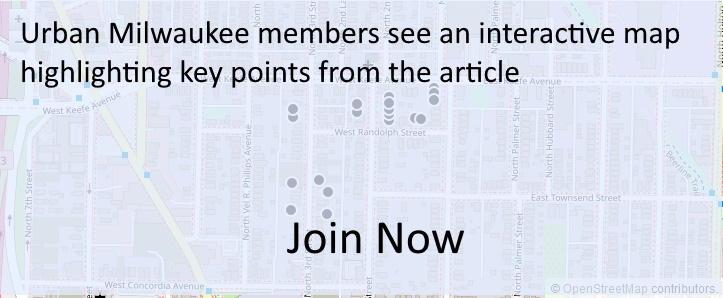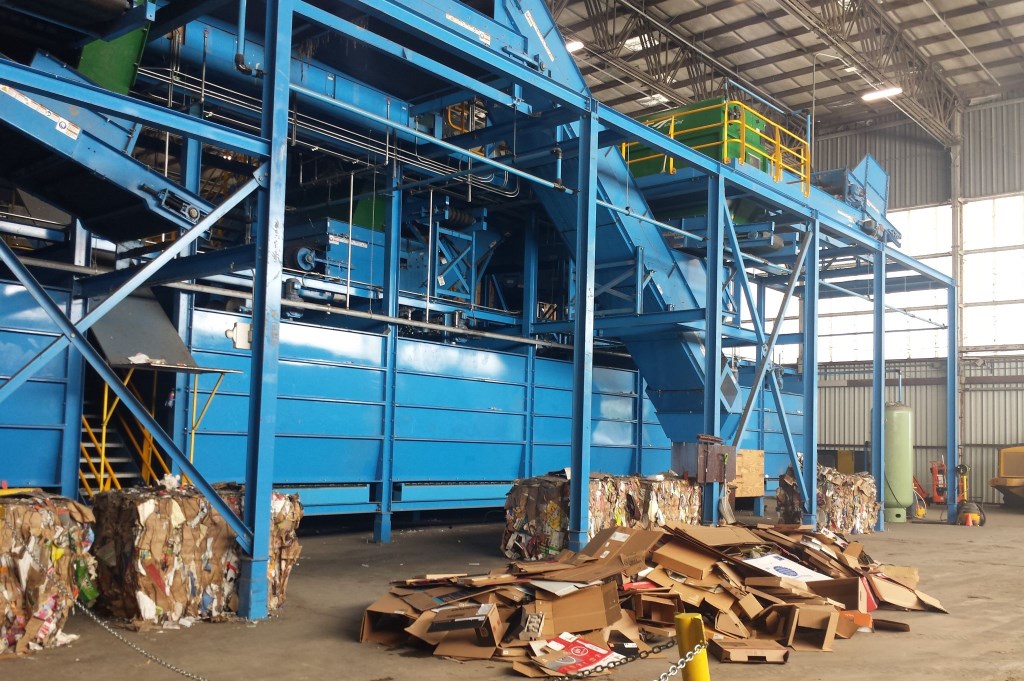What’s Next For Fire Damaged Recycling Center?
Equipment is totaled, but building could be salvaged.
The future of Milwaukee’s recycling center is a hot topic within City Hall.
That’s because in May 2023 it became a flaming hot mess and has been shuttered ever since. The city has been diverting its recycling to private handlers since the fire.
While not formally on any agenda, the future of the Menomonee Valley facility popped up in two different committee meetings this week.
Developer Kendall Breunig, who is attempting to rezone a vacant, historic factory across the Menomonee River for use as housing, endorsed moving it Monday when the Historic Preservation Commission reviewed his proposal.
On Wednesday, Department of Public Works sanitation services manager Rick Meyers said that all of the equipment needed to be replaced. “The equipment was deemed a total loss with the damage it took,” said Meyers, while presenting an annual report on the city’s recycling efforts. “The building has some substantial damage, but it could also be used again.”
The Materials Recovery Facility (MRF) is a longstanding facility at 1401 W. Mt. Vernon Ave. that was renovated in 2015 into a modern, single-stream facility that is jointly owned by the city and Waukesha County. A private operator manages the on-site operation.
What does DPW intend to do next? “We will be updating more specifically on that item soon,” said Meyers. The discussion is likely to occur next month during DPW’s 2025 budget presentation.
The 2024 budget included an oddly-precise $456,174 for repairs or the study of a new location. When the Common Council reviewed the budget request last fall, DPW officials said they were still assessing the full scope of the damage. No council member volunteered a location in their district for the new facility, which draws dozens of daily truck trips when operational.
“We have been assessing, we have been working with a consultant and costing out some options for the long term,” he said. “We don’t have a specific alternative site that we can study in detail.” The city’s garbage and recycling manager said a hypothetical greenfield site is being used as a baseline estimate.
However, the city is also considering whether it needs to have its own recycling facility.
“We are looking at the whole business model again, and if the case is still there for public ownership,” he told the committee.
That wouldn’t mean the end of recycling, but it could mean the city would rely on private operators entirely.
Currently, said Meyers, all of the city’s recycling is being collected at a DPW transfer station on W. Lincoln Avenue near S. 35th Street and then trucked in larger vehicles to a Waste Management facility in Germantown. When the fire initially shuttered the MRF, the Germantown facility was closed for an expansion and the city was forced to send its recycling to facilities all across the state.
At the time, Meyers said the cost was being covered by insurance, which had a maximum $5 million cap and was expected to last two years.
Moving the facility would free up 8.8 acres of waterfront land for development and is also expected to improve the value of nearby properties. Much of The Valley has been substantially redeveloped from its primary use as a railroad yard when the recycling facility was first constructed.
Milwaukee collected 24,338 tons of residential recyclables in 2023, a drop of 1,630 tons versus 2022, according to the newly-released report. The landfill diversion rate remained steady at 25%. “Overall landfill waste dropped by about 9,000 tons,” said resource recovery manager Laura Stevens. “This kind of range isn’t unusual.”
One of the lagging categories, by weight, is electronics. In 2023, 977,634 pounds of recycled electronics were collected at the city’s two drop-off centers, a drop of 14.7%. “This is consistent with trends the [Wisconsin Department of Natural Resources] is seeing,” said Stevens. Electronics are getting lighter and people are also likely to keep the smaller items at home, in the off chance they might use them.
But whatever you do with that old phone, don’t throw it in curbside recycling or garbage. A battery was suspected to have caused the MRF fire, though the latest report says the cause remains officially unknown. “Based on past fires at the MRF and others across the country, it might have been caused by contamination like a battery or other flammable material,” says the report.
Residents can also keep plastic bags out of their recycling bins, the thin bags jam sorting equipment.
Recycling, which is a partially unfunded state mandate, had a reported cost of $14.2 million in 2023. Those costs were partially offset by a $2.3 million state grant, $410,000 in commodity sales and $1.2 million in avoided landfill costs. The commodity sales dropped by $1.4 million year-over-year, which was attributed to a drop in the market value of certain commodities to “atypical lows.” Costs grew by $2.7 million, which the report attributed to the MRF fire and resulting changes.
Legislation Link - Urban Milwaukee members see direct links to legislation mentioned in this article. Join today
Existing members must be signed in to see the interactive map. Sign in.
If you think stories like this are important, become a member of Urban Milwaukee and help support real, independent journalism. Plus you get some cool added benefits.






















Its taken 16 months so far to wonder what to do with it. Imagine how long it will take to DO something with it.
Keep it central!
Households and businesses throughout greater Milwaukee benefit hugely from shorter trips to recycling and from recycling to processors and users. (Via truck, rail, barge?, ship).
Because we don’t use all-cost accounting. we don’t learn that the total economic value to households and businesses in the Metro area, though comprised of smaller individual amounts, is ongoing and greater than whatever commerce can provide on that land through development.
Recycling is an obligation and a mission.
The aforementioned gains are only part of the equation.
Every time we frack, drill, mine; haul oil, ore, minerals, lumber, clay, chemicals etc. then remake what we’re constantly (and stupidly) throwing away, we set ourselves back – through our health,, environment, and economy.
When we show up with our products in the recycling marketplace, having hauled them farther rather than closer to the point of generation raises our costs.
If we’re not competitive, we may end up having to ‘eat’ some part of them – for a looooong time!